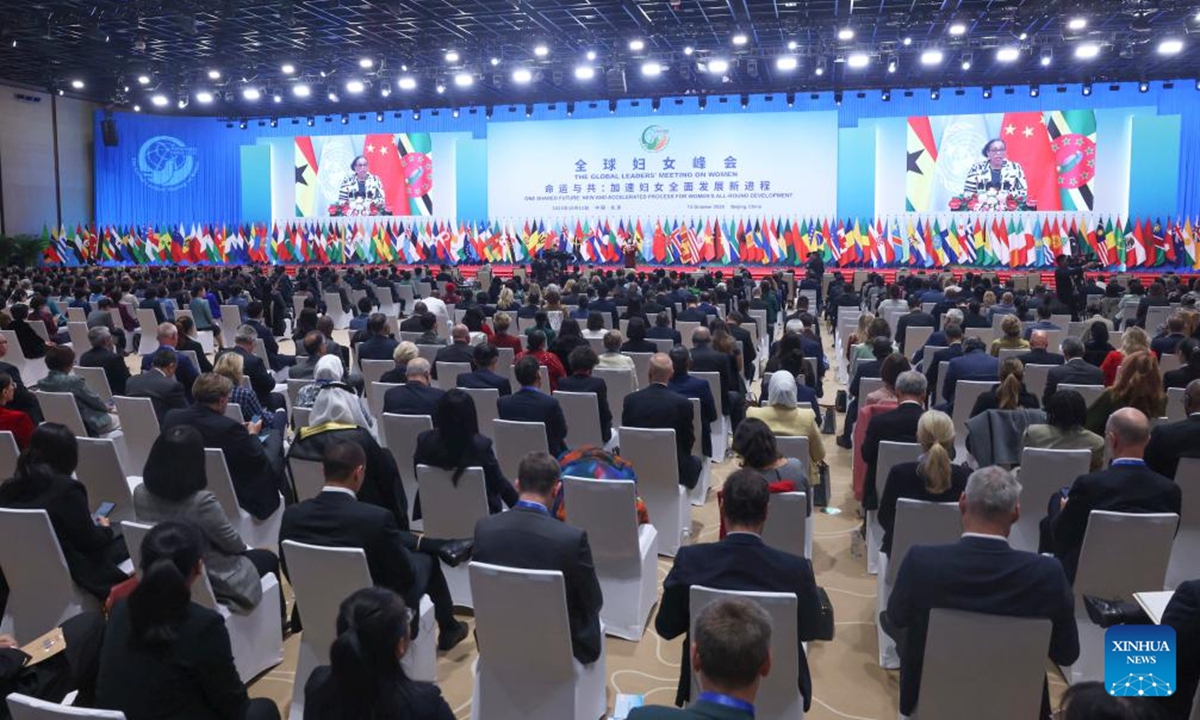
The opening ceremony of the Global Leaders' Meeting on Women is held in Beijing, capital of China, Oct. 13, 2025. The Global Leaders' Meeting on Women was held in Beijing on Monday. Photo: Xinhua
The Global Leaders' Meeting on Women is being held in Beijing from Monday to Tuesday. Heads of state, heads of government, parliamentary leaders, vice-premier-level officials, ministerial representatives, leaders of the UN and international organizations, foreign envoys to China, and other guests from over 110 countries together convened this grand event. Amid warm applause, President Xi Jinping delivered a keynote speech titled "Carrying Forward the Spirit of the Beijing World Conference on Women and Promoting the New and Accelerated Process for Women's All-Round Development." In his address, President Xi urged all parties to revisit the purpose of the Beijing World Conference on Women, build greater consensus, broaden forward paths, and take more concrete actions to accelerate the new process of women's all-round development. He put forward four important proposals, contributing China's solutions to the development of women worldwide. The speech has received high praise, and public opinion generally regards this summit as a new milestone in the development of women's causes globally.
The World Conference on Women was held in Beijing 30 years ago - at a time when the global political order was being reshaped, it was a women's conference of major significance. It was at that conference that the consensus "women's rights are human rights" was established on a global scale, elevating gender equality to a central issue in global governance and social progress. The Beijing Declaration and Platform for Action provided a systematic framework for national women's policies and laid the foundation for the international women's movement over the following 30 years. From then on, "equality, development, and peace" became the common goals of the global women's cause, and the "Beijing Spirit" came to stand as a key principle driving human social advancement.
On the occasion of the 30th anniversary of the World Conference on Women in Beijing, China once again convened the Global Leaders' Meeting on Women. Whereas 30 years ago, when Beijing witnessed the world's determination for women's pursuit of equality, today, the world sees China's commitment in action, contributing Chinese wisdom and solutions to advancing women's development. Over the years, China has provided opportunities and guarantees for the global women's cause through its own development. The country has trained more than 200,000 women from over 180 countries and regions and explored "small but beautiful" public welfare projects targeting foreign - especially developing - countries. Whether in global poverty reduction efforts or within frameworks like the Belt and Road Cooperation and the Shanghai Cooperation Organization, the cases of China promoting global gender equality and women's comprehensive development are widespread.
The four proposals that President Xi put forward at the summit are namely joining efforts in fostering an enabling environment for women's growth and development, cultivating powerful momentum for the high-quality development of women's cause, developing governance frameworks to protect women's rights and interests, and writing a new chapter in promoting global cooperation on women. These initiatives organically integrate women's development with global sustainable development, are in line with China's Global Development Initiative, Global Security Initiative, Global Civilization Initiative, and Global Governance Initiative. They are also a vivid example of putting the vision of a community with a shared future for humanity into practice in the field of global women's development. The proposals are visionary and pragmatic. China not only takes concrete actions to support all countries, especially developing ones, but also contributes valuable ideas as important public goods for humanity.
From Beijing to Beijing, the Global Leaders' Meeting on Women embodies an echo of history. It is both a continuation of the spirit of the Fourth World Conference on Women held in Beijing 30 years ago and a new declaration oriented toward the future. Today, the world is undergoing profound changes unseen in a century, marked by frequent wars and conflicts, widening wealth and gender gaps, and emerging challenges such as climate change, the technology divide, and digital security. Women's development still faces complex challenges. Once again, Beijing has become the focus of global attention, providing timely and significant answers to the pressing question of how women's advancement can "maintain progress and prevent regression" amid global turbulence.
In the Chair's Statement released at the summit, participants highly commended China's contributions and positively evaluated its important initiatives in support of global women's development. The answer lies not only in China's consistent sense of responsibility but also in the certainty and stability of its development philosophy. Domestically, China adheres to a people-centered approach to development, ensuring that progress benefits all citizens, including women. Internationally, China upholds the vision of building a community with a shared future for humanity and is committed to achieving shared growth through consultation and collaboration, and creating a better world for all women and for all people. The world can be confident that irresponsible practices such as "withdrawal from cooperation" or "policy reversals" will never occur in China.
This summit sent a clear message to the world: regardless of how the international situation changes, genuinely promoting gender equality and realizing women's all-round development remain a shared global mission and moral responsibility. By taking China as its platform, it has brought together the strength of countries from both the Global South and the Global North, reenergized the Beijing Declaration and Platform for Action with renewed vitality, and injected fresh momentum into the United Nations 2030 Agenda for Sustainable Development. It is foreseeable that the path starting from Beijing will extend toward a more equal, just, and better future, allowing the ideals of equality, development, and peace to once again illuminate the path of human civilization.


